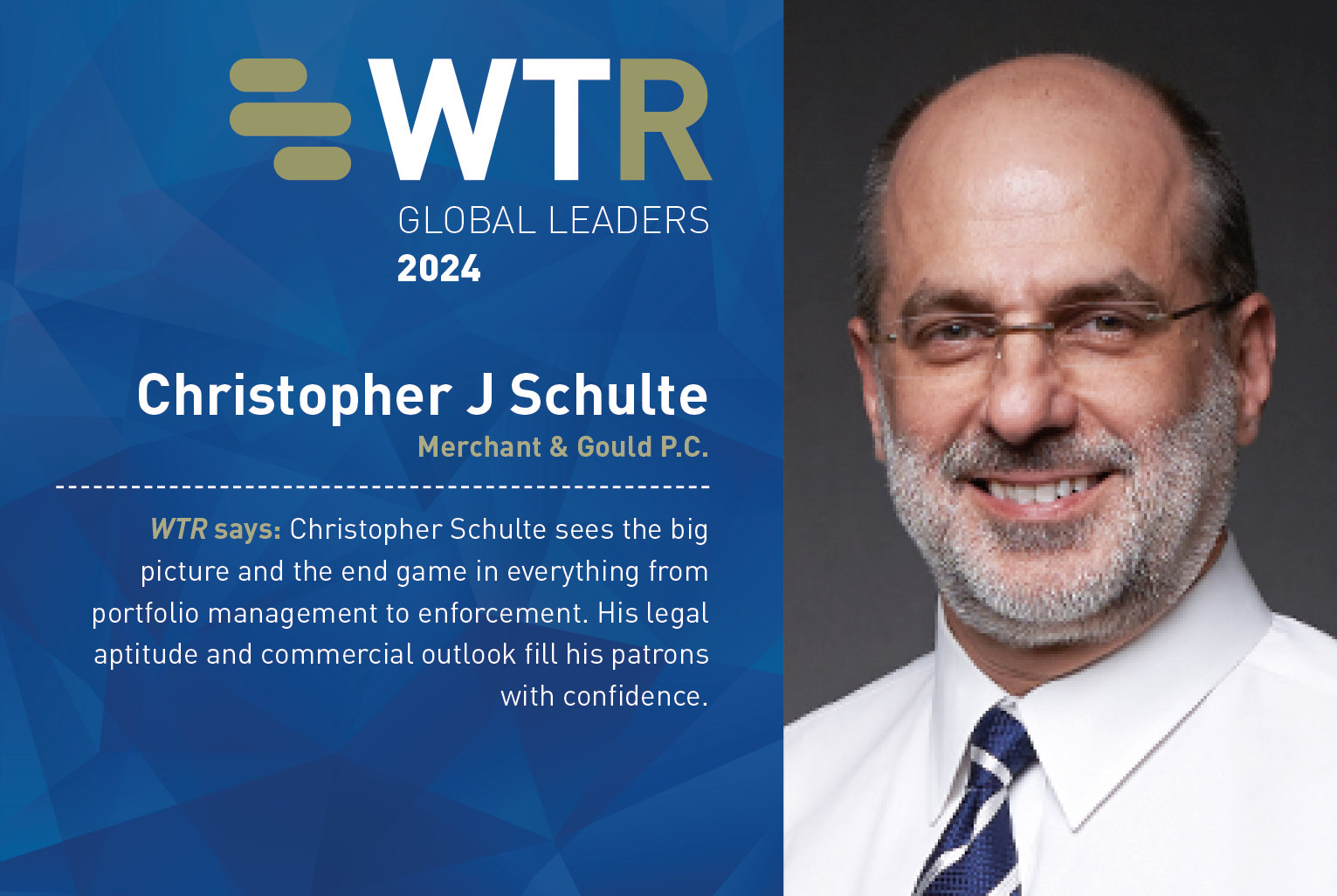Christopher J Schulte
In your view, what is the key to effective innovation in the legal industry?
The key to driving innovation is understanding what clients need, keeping up with the latest trends and integrating technology to enhance services. At Merchant & Gould, we've done that with our Worldwide Absolute Ground Screening service (WAGS). I'm proud to say that this cutting-edge database and service boosts client experience and significantly improves our global clearance efficiency. WAGS showcases our commitment to combining legal expertise with technological innovation to provide tailored, efficient solutions – even in the well-trodden field of trademark law.
Can you tell us more about the development process for WAGS, and how is it impacting clients?
The inspiration stemmed from a clear need in the global trademark landscape. As we prepared for the rollout of our clients’ trademarks, we recognised the difficulties in ensuring that they were viable across international markets. The development process involved me partnering with Trademarks OnPoint to tackle the problem. I assisted them in developing a categorisation of absolute-ground refusals issued to Madrid Protocol extensions and on file at WIPO. Together, we created a powerful tool that made the data easily searchable, allowing us to quickly identify potential issues like offensive meanings or overly descriptive terms that could lead to rejections. WAGS embodies our commitment to innovation – it's how we turned a complex challenge into a strategic advantage for our clients.
Further, WAGS helps our clients immersed in global branding efforts to avoid ‘rollout killers’ – hard-to-detect absolute-ground refusals that are not evident from normal confusion-based clearance. WAGS proactively identifies potential issues with trademark applications, which protects the integrity of a brand’s global rollout. It enhances cost and time efficiency by reducing the likelihood of application rejections, supports informed decision making with data-driven insights and strengthens clients’ global market presence by ensuring that trademarks are appropriate and poised for success, thus providing a competitive edge in international branding efforts.
How are you managing the proliferation of scams targeting trademark applicants in the United States?
We have been aggressive in taking action against scammers. Our clients were recently solicited by purported trademark attorneys claiming that a third party was considering filing an application for their company name, which would then bar our clients’ trademarks. The claim was false and the ‘attorneys’ turned out to be offshore actors. My partner Danielle Mattessich took the lead on reporting them to the USPTO, California Bar and FBI. She also submitted suspension demands to the parties’ website hosts; they agreed and suspended their accounts.
What inspired you to pursue a career in intellectual property, and what advice would you give to someone considering a similar path?
I started my legal career 30 years ago as an appellate litigator. One of the commercial cases I worked on involved trademark infringement. I was intrigued by the subject matter and spent the next few decades learning everything I could about this area of the law, as I never had the chance to take any IP coursework in law school. I transitioned to transactional practice in the corporate law department at my old firm, which allowed me to work on prosecution and develop my own client base. This brought me to my current firm, which only practises IP law.
I recently began teaching a trademark law course at the University of Minnesota Law School. Many of my students ask how to get started in a trademark career. Reflecting on my path, one way to become a trademark lawyer is to work with a corporate transactional or commercial litigation group at a general practice firm, as getting hired into a trademark-only practice can be difficult. Developing a trademark practice in such an environment is possible, as that is how I got to Merchant & Gould.
How do you predict that client demands might develop over the next 12 months, and how are you preparing to meet these?
Previously we were working with clients on trademark-related metaverse issues. Now AI is the hot topic. Several of our software clients are developing AI solutions. However, we are now being asked by clients in other fields to assist in trademark selection and protection. We have had to adapt our clearance and filing techniques to facilitate this rapidly evolving technology.
On the enforcement front we are seeing more AI-developed infringements, often against well-known clients. This has required us to develop aggressive protection schemes around client images and likeness through unique filing strategies that work outside our traditional protection efforts.
Christopher J Schulte
Partner
[email protected]
Christopher Schulte is a leading trademark attorney at Merchant & Gould, specialising in global trademark strategy and enforcement. He expertly navigates complex clearance issues for his clients' international expansion and develops innovative methods to detect and combat online and marketplace infringement. Mr Schulte serves as co-chair of the firm’s trademark practice group and has served as a member of several domestic and international trademark organisations, including the American Bar Association and INTA.
